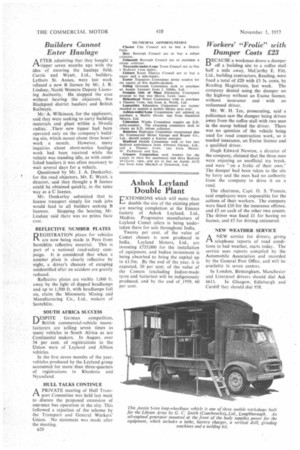Builders Cannot Enter Haulage
Page 54

If you've noticed an error in this article please click here to report it so we can fix it.
AFIER admitting that they bought a tipper seven months ago with the idea of entering the haulage field; Currie and Wyatt, Ltd., builders, Lytham St. Armes, were last week refused a new B lieence by Mr. J. R. LindSay, North Western Deputy Licensing Authority. He stopped the ease without hearing the objectors, five Blaekpool: district hauliers and British Railways.
• Mr.-A. Wilkinson, for the applicants, said they were seeking to carry building materials 'and plant within a. 50-mile radius. . Their new tipper had been Operated only on the company's building site, which meant about three hours' work a month. However, many inquiries about short-notice haulage work had been received while the vehicle was standing idle, as with established hauliers it was often necessary to wait several days for a vehicle.
Questioned by Mr. J. A. Dunkerley, for the road objectors, Mr. E. Wyatt, a director, said they thought a B licence could be obtained quickly, in the same way as a C licence.
Mr. Durkerley submitted that to license transport simply for rush jobs would lead to all builders seeking B licences. Stopping the hearing, Mr. Lindsay said there was no prima facie case.
REFLECTIVE NUMBER PLATES D EGISTRATION plates for vehicles are now being made in Peru from Scotchlite reflective material. This is part of a national road-safety campaign_ It is considered that when a number plate is clearly reflective by night, a driver's chances of escaping unidentified after an accident are greatly reduced.
Reflective plates are visible 1,000 ft. away by the light of dipped headlamps and up to 1,500 ft. with headlamps full on, claim the Minnesota Mining and Manufacturing Co., Ltd.. makers of Scotcbli te.
• SOUTH AFRICA SUCCESS
DESPITE German compe:ition, British commercial-vehicle manufacturers are selling seven times as many vehicles in South Africa as are Continental makers. In August, over 54 per cent. of registrations in the Union were of Leyland and Albion vehicles,
In the first seven months of the year, vehicles produced by the Leyland group accounted for more than three-quarters of registrations in Rhodesia and Nyasaland.
HULL TALKS CONTINUE
L-3. A PRIVATE meeting of Hull Transport Committee was held last week to discuss the proposed extension of one-man bus operation in the city. This followed a rejection of the scheme by the Transport and General Workers' Union. No statement was made after the meeting.
n20
























































































































